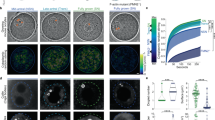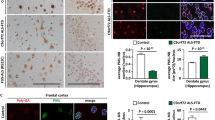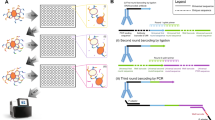Abstract
USING the technique of nuclear transfer1, it has been shown that many of the cellular properties of the large, uninucleate amœbæ, Amoeba proteus and A. discoides, are influenced by self-replicating cytoplasmic hereditary determinants. The characters determined in this way are those which depend on the way in which macromolecules, the specificity of which has been determined by nuclear genes, are organized into functional units2.
This is a preview of subscription content, access via your institution
Access options
Subscribe to this journal
Receive 51 print issues and online access
$199.00 per year
only $3.90 per issue
Buy this article
- Purchase on SpringerLink
- Instant access to the full article PDF.
USD 39.95
Prices may be subject to local taxes which are calculated during checkout
Similar content being viewed by others
References
Comandon, J., and de Fonbrune, P., C.R. Soc. Biol., 130, 740 (1939).
Danielli, J. F., Lorch, I. J., Ord, M. J., and Wilson, E. G., Nature, 176, 1114 (1955).
Danielli, J. F., Ann. N.Y. Acad. Sci., 78, 675 (1959).
Cole, R. J., and Danielli, J. F., Exp. Cell Res. (in the press).
Author information
Authors and Affiliations
Rights and permissions
About this article
Cite this article
HAWKINS, S., COLE, R. & DANIELLI, J. Preliminary Studies on the Basis of Cytoplasmic Inheritance in Amœbæ. Nature 196, 396 (1962). https://doi.org/10.1038/196396a0
Issue date:
DOI: https://doi.org/10.1038/196396a0



